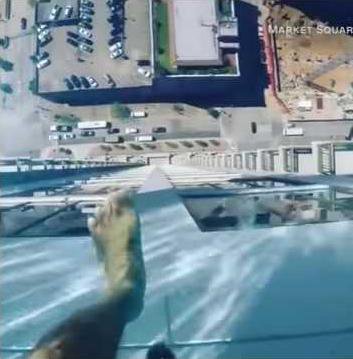HOUSTON Making things out of glass seems like tempting fate. Glass, by definition, is fragile, breakable and often temporary. It inspires adjective use like shatters and cracks.
So footage of a glass-bottomed pool in a Texas apartment complex has the internet feeling a little squeamish.
At Market Square Tower in downtown Houston, an Instagram video went viral after it showed someone walking out onto an exposed glass portion of the residents pool that hangs over a section of downtown, 43 floors in the air. Apparently, the glass is 5 inches thick and is engineered to withstand the force of a hurricane, according to a video by CNN.
The Instagram post of the footage (its literally of feet, so the term is particularly apt) garnered comments like, You couldn't pay me enough money to get in THAT pool! Nope...uh uh, and The only thing I can imagine is that glass breaking and me falling to my death. I thought this would be cool but never mind it's terrifying.
The pool is only open to the residents of Market Square Tower, so those who dont live there or arent friends with someone who lives in the building need not apply.
Would you walk out over the glass ledge of this pool? Let us know in the comments!
So footage of a glass-bottomed pool in a Texas apartment complex has the internet feeling a little squeamish.
At Market Square Tower in downtown Houston, an Instagram video went viral after it showed someone walking out onto an exposed glass portion of the residents pool that hangs over a section of downtown, 43 floors in the air. Apparently, the glass is 5 inches thick and is engineered to withstand the force of a hurricane, according to a video by CNN.
The Instagram post of the footage (its literally of feet, so the term is particularly apt) garnered comments like, You couldn't pay me enough money to get in THAT pool! Nope...uh uh, and The only thing I can imagine is that glass breaking and me falling to my death. I thought this would be cool but never mind it's terrifying.
The pool is only open to the residents of Market Square Tower, so those who dont live there or arent friends with someone who lives in the building need not apply.
Would you walk out over the glass ledge of this pool? Let us know in the comments!








